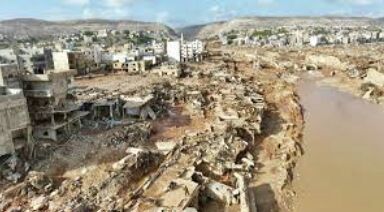Devastating Flash Floods Ravage Eastern Libya: Thousands Dead, Cities Destroyed, and Urgent International Aid Needed
Devastating flash floods in Derna, Libya, with thousands dead, missing, and displaced. It highlights the role of climate change and the urgent need for international assistance.
In the devastating aftermath of flash floods in eastern Libya, the city of Derna has emerged as the hardest hit, with thousands of casualties and extensive damage reported. According to the state news agency, at least 5,300 people have been confirmed dead in Derna alone, with an additional 6,000 still missing and over 20,000 displaced and without homes or basic necessities. The health minister in Libya's eastern government described the situation as "catastrophic," with bodies still lying on the ground and hospitals overwhelmed. Aid groups have warned that the death toll is likely to rise significantly in the coming days. The collapse of a dam has been identified as a major contributing factor to the catastrophic flooding in Derna.
Heartbreaking to see the havoc caused by flash floods in Libya. Its yet another stark reminder of the urgent need for global action on climate resilience and preparedness.
— مزمل حسین (@Muxammilhusain) September 12, 2023
#LibyaFloods #ClimateAction #Libya #Libye #LibyaFlood pic.twitter.com/dmu8Gs87iV
A cellphone video shows the destruction of the dam, which led to a "tsunami-like wall of mud and water" engulfing the city. Disturbing visuals of buildings washed away and vehicles overturned have been shared on social media, highlighting the extent of the destruction. The flash floods have caused widespread devastation in Derna, with multistory buildings collapsing and houses and cars disappearing in the raging waters. The situation is described as a "calamity of epic proportions" by a UN official. The flash floods in Libya are not isolated incidents but are symptomatic of the larger global issue of climate change. The International Rescue Committee emphasizes the need for action against climate change, stating that extreme weather events like these floods have become more frequent and intense due to climate change.
The organization highlights the challenges faced by communities in conflict-affected regions, making it even harder for them to cope and rebuild. The Libyan government is facing immense challenges in addressing the humanitarian needs and managing the aftermath of the disaster. The government in eastern Libya, based in Benghazi, is in rivalry with the western government in Tripoli. The Libya envoy to the International Federation of Red Cross and Red Crescent Societies estimates that the final death toll could be significantly higher, with more than 10,000 people currently missing.
The Libyan Red Crescent and the government alone are not equipped to handle the scale of the disaster, and international assistance is urgently needed. Multiple countries have offered to send aid and rescue teams to help Libya in its time of crisis. Algeria, Egypt, France, Italy, Qatar, Tunisia, Turkey, and the United States are among the countries that have expressed their willingness to provide assistance. Rescue teams from Turkey have already arrived in eastern Libya, and the UN has pledged support as well.
The Libyan government has declared three days of national mourning and emphasized the unity of all Libyans in the face of the disaster. The flash floods in Libya serve as a tragic reminder of the devastating impact of natural disasters on vulnerable communities. As climate change continues to exacerbate extreme weather events, the need for urgent action and international cooperation becomes even more evident. The immediate focus should be on providing essential assistance to the affected population and supporting long-term efforts for climate resilience and preparedness in conflict-affected regions.




